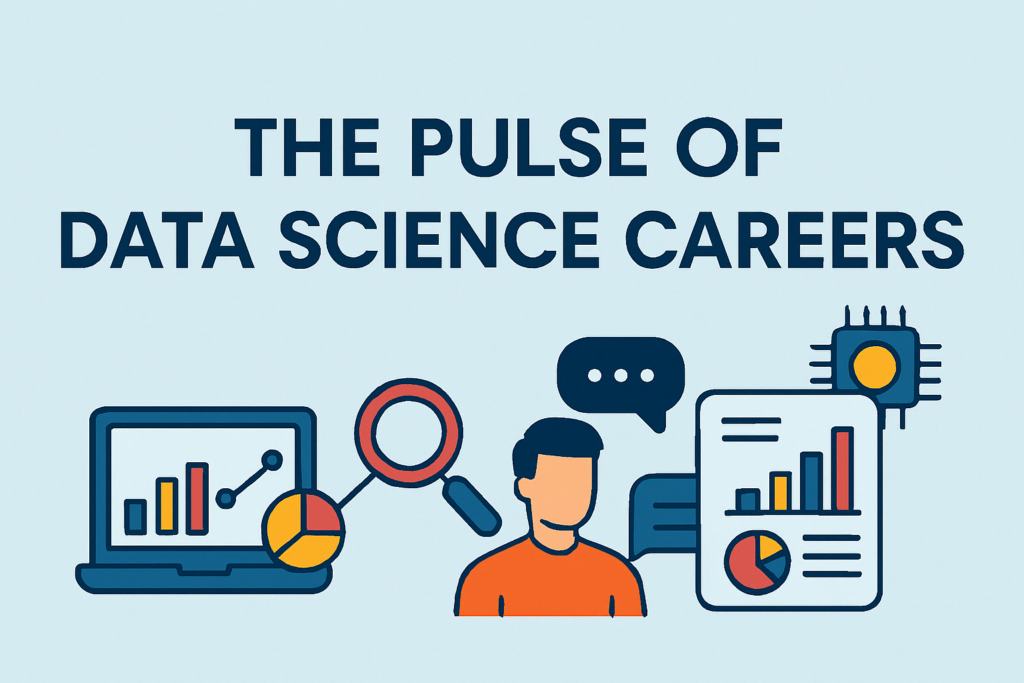In today’s digital-first world, data is more than just numbers—it’s the new oil fueling innovation, decision-making, and competitive advantage. With industries undergoing rapid digital transformation, the demand for skilled data professionals is rising at an unprecedented rate. From healthcare to finance, retail to entertainment, every sector is seeking individuals who can turn raw data into actionable insights. This dives into the heartbeat of the data science job market—its growth, opportunities, essential skills, and what aspiring professionals need to know to thrive.
Why Data Science Is Booming
The explosion of big data, IoT devices, and AI technologies has led to a seismic shift in how organizations operate. Every digital touchpoint—from a customer’s online purchase to a tweet—generates data. This has made data science not just relevant but essential.
According to multiple industry reports, the global data science market is projected to grow exponentially in the coming years. Businesses are increasingly investing in data-driven strategies, and this shift has created a significant talent gap—meaning opportunities abound for those with the right skills.

Top Roles in the Data Science Ecosystem
Data science is not a one-size-fits-all career path. It encompasses a wide range of roles, including:
- Data Analyst – Interprets data and presents insights using visualization tools.
- Data Scientist – Designs complex models and uses machine learning to make predictions.
- Machine Learning Engineer – Focuses on building and deploying scalable ML algorithms.
- Data Engineer – Creates and maintains the infrastructure for data generation and processing.
- Business Intelligence Analyst – Translates data into business strategies using tools like Power BI or Tableau.
Each role requires a slightly different blend of technical and analytical skills, but all revolve around one core objective: turning data into value.
Skills That Make You Stand Out
While the tools and platforms may change over time, some core competencies remain critical for success in data science:
- Programming Knowledge – Python and R are the most widely used languages. SQL is essential for data querying.
- Mathematics and Statistics – Understanding distributions, probability, and statistical testing is key.
- Data Wrangling and Cleaning – Real-world data is messy. Knowing how to clean and structure data is a foundational skill.
- Machine Learning & AI – Familiarity with supervised and unsupervised learning, deep learning, and model evaluation techniques.
- Visualization – Communicating results effectively using tools like Matplotlib, Seaborn, or Tableau.
- Cloud Platforms – Experience with AWS, Azure, or Google Cloud can provide an edge.
Soft skills like communication, critical thinking, and problem-solving are also highly valued, especially when explaining complex findings to non-technical stakeholders.
Industries Actively Hiring Data Scientists
Data science is industry-agnostic. Some of the most active sectors include:
- Finance & Banking – Risk modeling, fraud detection, algorithmic trading.
- Healthcare – Predictive diagnostics, patient outcome modeling, genomics.
- Retail & E-commerce – Customer segmentation, recommendation systems, inventory forecasting.
- Manufacturing – Predictive maintenance, supply chain optimization.
- Media & Entertainment – Audience analytics, content recommendation engines.
Each industry presents unique challenges and datasets, which makes the field both dynamic and diverse.
Entry Points for Newcomers
For those just stepping into the world of data, the journey can seem daunting. However, there are multiple entry points depending on your background:
- From Tech – If you have experience in software development or IT, transitioning into data engineering or ML roles can be smooth.
- From Business – Analysts and project managers often move into business intelligence or data analytics roles.
- From Academia – Researchers in math, physics, or economics frequently pivot to data science because of their strong statistical foundation.
Project-based learning, internships, and contributing to open-source or real-world datasets (like those on Kaggle or GitHub) can accelerate the transition.
Future Trends to Watch
The field of data science is evolving rapidly. Here are a few trends shaping the future:
- AutoML – Tools that automate parts of the modeling process, making data science more accessible.
- Explainable AI (XAI) – Increased focus on transparency in AI-driven decisions.
- Edge Computing – Moving data processing closer to where data is generated.
- Ethical Data Science – Emphasis on fairness, accountability, and bias mitigation.
- Multimodal Learning – Models that can process text, image, and audio simultaneously.
Staying current with these trends through articles, research papers, and community discussions is crucial.
Conclusion: A Career with Impact and Evolution
A career in data science is more than just crunching numbers—it’s about solving real-world problems with creativity and logic. As data continues to shape our world, the role of data scientists and analysts will only become more pivotal.
For those willing to learn continuously, embrace complexity, and think critically, data science offers a future-proof, fulfilling, and impactful career path.

